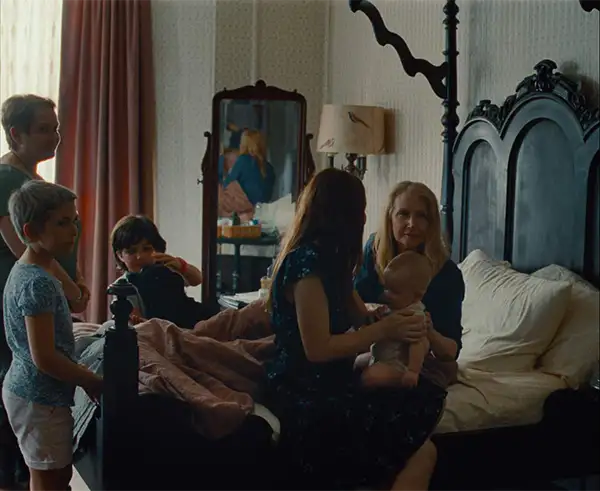Monica is an extraordinary, delicate story of acceptance and healing that takes a fresh look at a marginalised community.
The mere knowledge of what Andrea Pallaoro’s Monica is about is itself a spoiler for the rich, emotional catharsis that occurs the moment you piece together this mosaic of a film. It’s not a twist, nor is it anything that should change how you view the central narrative that occurs in the movie but is instead a progressive emboldenment, led by a mentality we often lack in films of this kind. Monica is a film that refuses to flamboyantly present the subject as if they are something to be gawked at or to be prodded at for dramatic purpose, or the kind of project that exists for the director to be applauded for doing the bare minimum of representation.
When Monica (a spell-binding Trace Lysette) receives a call to return to her childhood home, she’s somehow unrecognisable to her ailing mother Genie (Patricia Clarkson). It’s not explicitly mentioned that this is Monica’s childhood home, but Monica floats around it like a welcome stranger. Within Monica’s childhood home stay her brother Paul (Joshua Close) and his wife Laura (Emily Browning), whom Monica is meeting for the first time. Laura introduces Monica into the house as if she has never been there before. Like Monica isn’t shirking away from the flickering ghosts of trauma that ebb in the home’s dusty corners.
Monica’s exploration of the house that she is over ten years distanced from is highlighted in each gorgeously composed frame of Katelin Arizmendi’s Academy ratio cinematography, framing Monica as diminutive within the walls of the aspect ratio. Arizmendi’s cinematography also gives the film a sense of hazy nostalgia, where it seems as if we are looking at faded Polaroid photos weathered by age, much like Monica is doing within this familiar but foreign space. Genie is told that Monica is there to help support the live-in nurse Letty (Adriana Barraza) in what would normally be a dumb ruse concocted by estranged siblings with the desire for subterfuge had Monica been recognisable to Genie.

The central crux of the film, and what ultimately elevates this from a simple tale of a woman returning home, is that Monica is a trans woman. This information adjusts how we view the film but it simultaneously invites you to see Monica as solely a woman’s journey. Pallaoro also incorporates ideas of subverting the male gaze, leering on Lysette’s legs, having her be promiscuous and lingering on her naked body. By gazing upon Lysette in that way, he is reminding audiences of her femininity, treating her in the same way that women have been shot through film history, validating her existence as a woman.
The history of trans film within western media feels like it shifts with Monica. Where Neil Jordan’s infamous Oscar-winning The Crying Game – a film where the reveal of a transgender woman’s penis induces vomiting in the man engaging in sexual activity with her – was repulsed by transgender people, Monica is unashamed of the elements of life that come with being trans, showing them without unnecessary spectacle. When watching Monica without knowing it is a trans story, realising she has transitioned comes not from characters reacting – repulsed, or otherwise – but from their lack of reaction. Instead, the family (and subsequently Pallaoro) treat Monica as the normal person she is, disposing of trite transphobic narratives that occupy films with trans characters. That the family lovingly embraces Monica back within the folds of their family feels quietly revolutionary for trans narratives. Not the least for casting Trace Lysette, a trans woman, as the lead in what is a once-in-a-generation performance of beautiful anguish.
None more so than when a flashback shows Monica’s eviction from the family’s life. The scene is emotionally excruciating, as the matriarch tells Monica outside the desolate, dingy bus station that Genie can’t be her mother anymore. This isn’t the first time Genie will be shown to avoid conflict, as the ambivalence to Monica’s return could be seen as both an avoidance and an amiable appeasement within Genie herself for Monica. The tiny crack in Clarkson’s voice as she says it elicits the kind of stinging evocation that makes the film a rare gem.
What makes Monica so fascinating is that Pallaoro is careful not to provide definitive proof as to why Genie doesn’t recognise Monica. It could be through transition, or it could be to Genie’s non-descript ailment, allowing the film to be read as that of an aging woman with Alzheimer’s unable to recognise their child. What could have been an explosive reaction for Genie around recognising her daughter post-transition is instead a delicate, understated response of a woman recognising her offspring after a decade of painful separation, whether the reason be that from transition or illness.
Pallaoro leaves all of the information around Monica’s life on screen. A scene where “I’m not your experiment” bursts out of her in anger at a ghosted date helps piece together her character’s thought process. Even when she’s seen injecting what would turn out to be estrogen, it is these small showcases of a trans life played out without being made into a dramatic ordeal is breathtakingly simple and yet, lifting away a curtain that we as an audience don’t know existed. When we see Monica in a room, we don’t know it’s her childhood bedroom but Lysette glides around it, dancing to O-Zone’s ‘Dragostea Din Tei’ in her underwear in a way that is both liberating for Monica herself but that we as an audience infer the safety she finally feels.
In a devastating but lean screenplay, Pallaoro, with co-writer Orlando Tirado, manages to stir up precise sentiment from minute inflections. A scene where Monica softly states about Genie not knowing her is next to the only dialogue in the scene, but, through Lysette’s performance and the tight 4:3 framing, we find ourselves enraptured by the delicacies and inflections that Monica has to offer.
Monica is a masterclass in showing, not telling that is quietly revolutionary for how trans lives are shown on screen. In western media, where trans stories are told too often via their trauma, to remove that conflict and instead create this soft, delicate film about acceptance and emotional healing feels like its own insurrection against the political narrative around trans people. Masterful, ethereal filmmaking that finds itself commanding emotion within every second of its runtime, combined with a Lysette performance that we should be considering as one of the greatest performances put to film in recent years.
Monica is now available to watch on digital and on demand in the US and various countries. The film will be released in UK & Irish cinemas on December 15, 2023.

